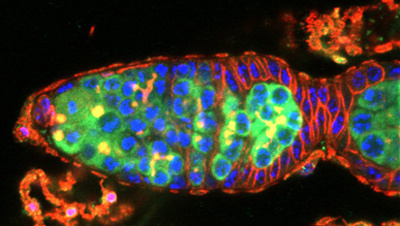Dietary amino acids play essential roles in metabolic processes that support normal tissue growth, repair, and function. For example, in Drosophila melanogaster, protein-deficient diets lead to reduced overall organismal growth during larval development and severely decreased egg production in adult females. Multiple tissues, therefore, must sense and respond to dietary protein input. Amino acid transporter proteins facilitate the movement of am ino acids across cellular membranes.

Based on high-throughput expression studies, the Drosophila genome is predicted to encode 58 amino acid transporters. In their new study, graduate student Ymani Wright and her mentor Dr. Alissa Armstrong investigated whetherthere were tissue-specific amino acid requirements for proper tissue function by assessing the complement of amino acid transporters expressed in several adult tissues. Using RT-PCR to assess transcript levels, they find that most of the 24 amino acid transporters examined are expressed in the head, thorax, abdomen, gut, and ovary, while a subset shows differential transcript expression.